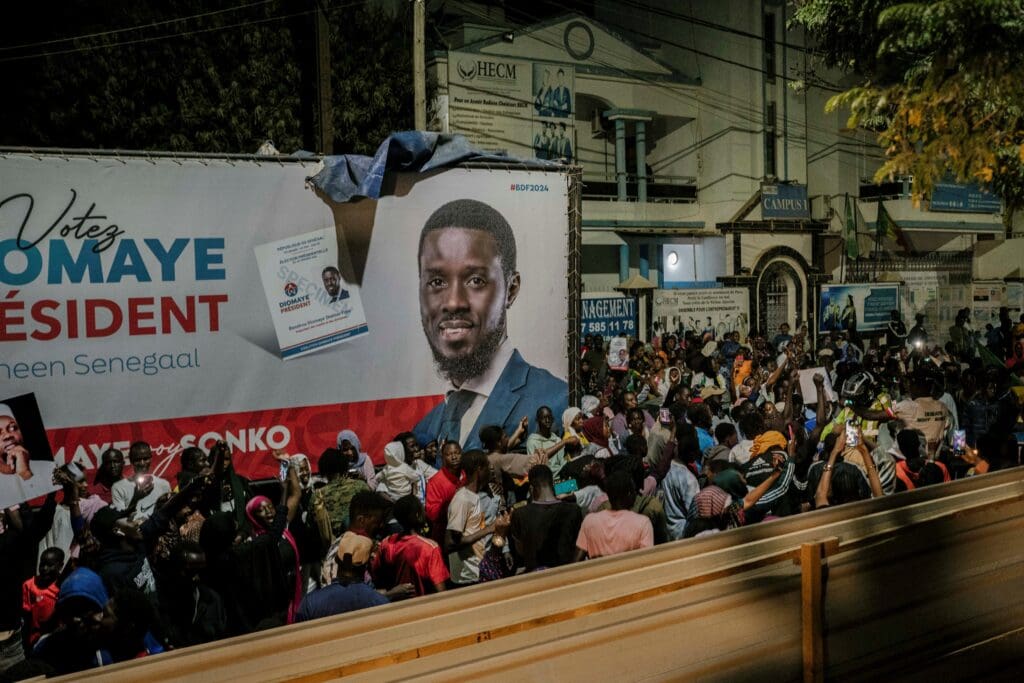Although Senegal’s GDP is dwarfed by that of the West African giant Nigeria, this small country with an open economy plays an outsize role on the continent, owing to its status as a “maturing democracy.” Senegalese pride themselves for having never suffered a coup since achieving independence from France in 1960. That record stands in stark contrast to the rest of the region, where, just in the past few years, governments have been overthrown in Guinea, Mali, Burkina Faso, Niger, and Gabon.
Of course, there have been fraught transitions of power and other related difficulties, not least under Senegal’s outgoing president, Macky Sall, who long remained silent about whether he would run again in violation of the constitutional term limit. Under mounting pressure from street protesters, he eventually announced that he would not seek another term – but then proceeded to postpone the election until a date long past the expiration of his mandate.
Following the deaths of several protesters and other incidents, Senegal finally held an election on March 24, owing in no small part to a constitutional court ruling striking down Sall’s attempt to extend his mandate. The president-elect is Bassirou Diomaye Faye, a former tax inspector who was in prison just days before the election, alongside his mentor, Ousmane Sonko. Sonko himself was barred from running, and his party, PASTEF (“Patriots of Senegal”), was dissolved last summer.
Faye ran (as an independent) on a platform to fight corruption and promote economic sovereignty, an agenda that resonates with an overwhelmingly young population whose patriotism is reminiscent of the post-independence era. In today’s quickly evolving geopolitical environment, many African societies see an opportunity to pursue their interests more assertively. And, like many other Africans, young Senegalese are frustrated with leaders who have proven unable or unwilling to focus on domestic priorities, and who have grown increasingly entangled with business interests.
Across the continent, economic liberalization, often promoted by international organizations to foster investment, has ended up backfiring, because weak anti-corruption rules allowed nurtured widespread collusion between politicians and foreign companies. According to Afrobarometer data for 2022, 73% of Senegalese believed that corruption had increased over the past 12 months.
To see what Africans see, consider BP’s 2017 discovery of large oil and gas reserves off Senegal’s coast. Initially, many hoped the bonanza would drive a national economic transformation. But the project has since been plagued by delays, corruption scandals, and concerns about environmental degradation. Similarly, liberalization policies targeting Senegal’s fisheries have failed to deliver economic inclusion. Instead, large companies have gotten away with overfishing, while ordinary Senegalese have been left behind.
In fact, despite recent data pointing to strong economic growth prospects, a significant drop in extreme poverty, and a continuous rise in access to electricity, young Senegalese now account for a growing share of undocumented migrants risking their lives to reach Europe (often by way of the Canary Islands).
This disconnect between an improving economic outlook and negative perceptions can be seen elsewhere in Africa, too. An increasingly educated, social media-connected younger population has higher aspirations than past generations, and it is demanding more from political leaders. That said, the aggregate figures may be masking issues such as low-quality services, including for basic utilities such as water and sanitation. Perceptions of rampant corruption make these problems seem even worse, feeding into public anger and discontent.
Another salient issue that Faye has promised to tackle is the uncertainty surrounding the West African Economic and Monetary Union (WAEMU). Through a newly forged alliance, Burkina Faso, Niger, and Mali recently announced they are quitting the Economic Community of West African States in response to the sanctions it imposed on them following their respective coups. Though the sanctions have since been lifted, the coup leaders seem committed to going their own way. Among other things, they intend to form a joint defense force, and to break away from the CFA Franc (shared by eight West African countries).
While attacks on the CFA Franc appeal to populations that are newly interested in asserting their sovereignty, abandoning the currency union altogether would certainly do more harm than good in the short run. If Faye manages to preserve the unity of the West African bloc, that outcome would be a notable achievement. The WAEMU could become the engine that powers a broader regional integration process under the African Continental Free Trade Area.
Trade within the AfCFTA commenced in 2021 – in the middle of the COVID-19 pandemic. Despite member states lifting tariffs, pervasive non-tariff barriers remain, highlighting the need for new reforms to promote fairer competition within and between African countries. Realizing the AfCFTA’s potential would not only stimulate cross-border investment and trade; it would also promote deeper continental integration in priority sectors such as agriculture, telecoms, electricity, and finance. In this context, the continent’s growing population could provide an impetus for more local production and job creation.
Faye’s resounding victory gives him a strong mandate to pursue anti-corruption measures and promote economic inclusion. But to make good on his campaign promises, he must first reinforce the country’s political checks and balances – including the independence of the judiciary – and ensure transparency at all levels of government. Failure to shore up Senegal’s democratic institutions would lead to more political roller-coaster rides like the one the country has just been through.
Across the continent, Africans – especially younger ones – are clamoring for change. Senegal’s new 44-year-old president could be the first to meet their demands.


